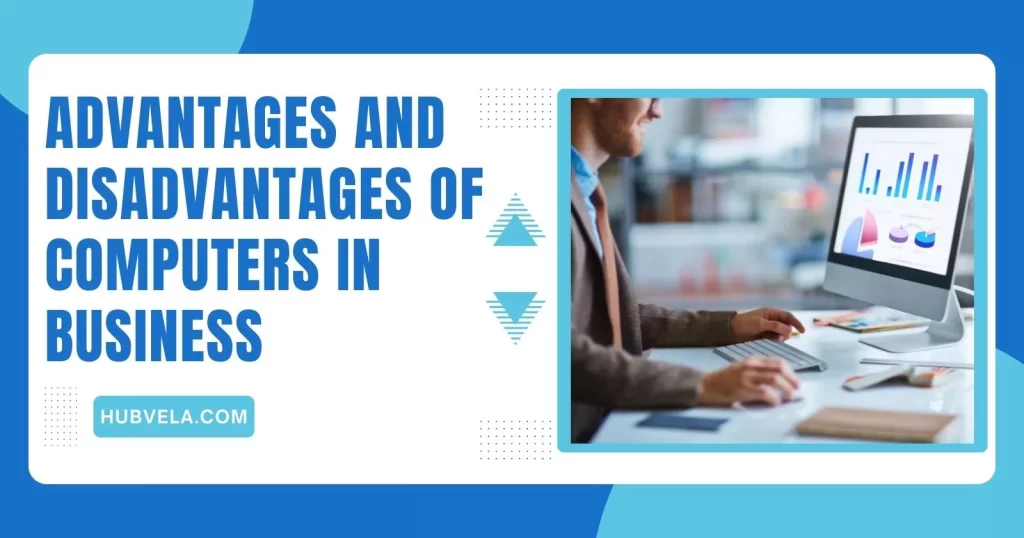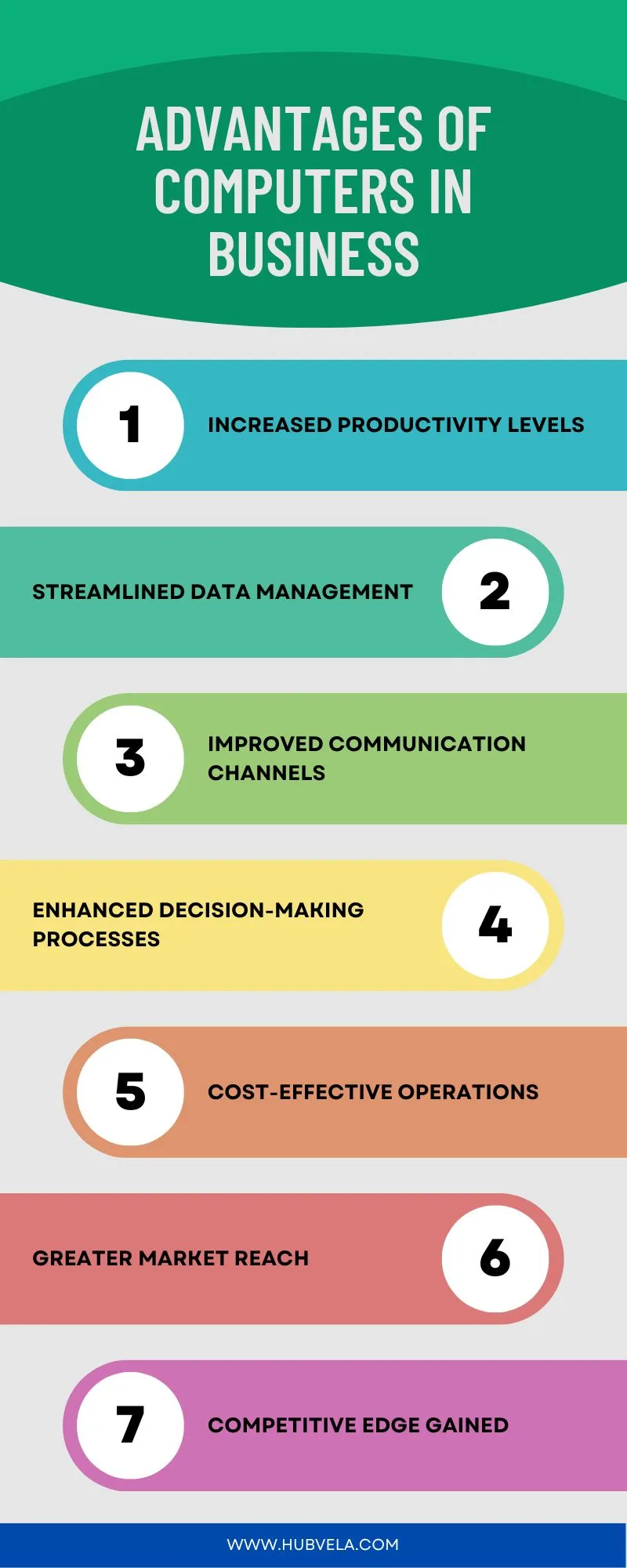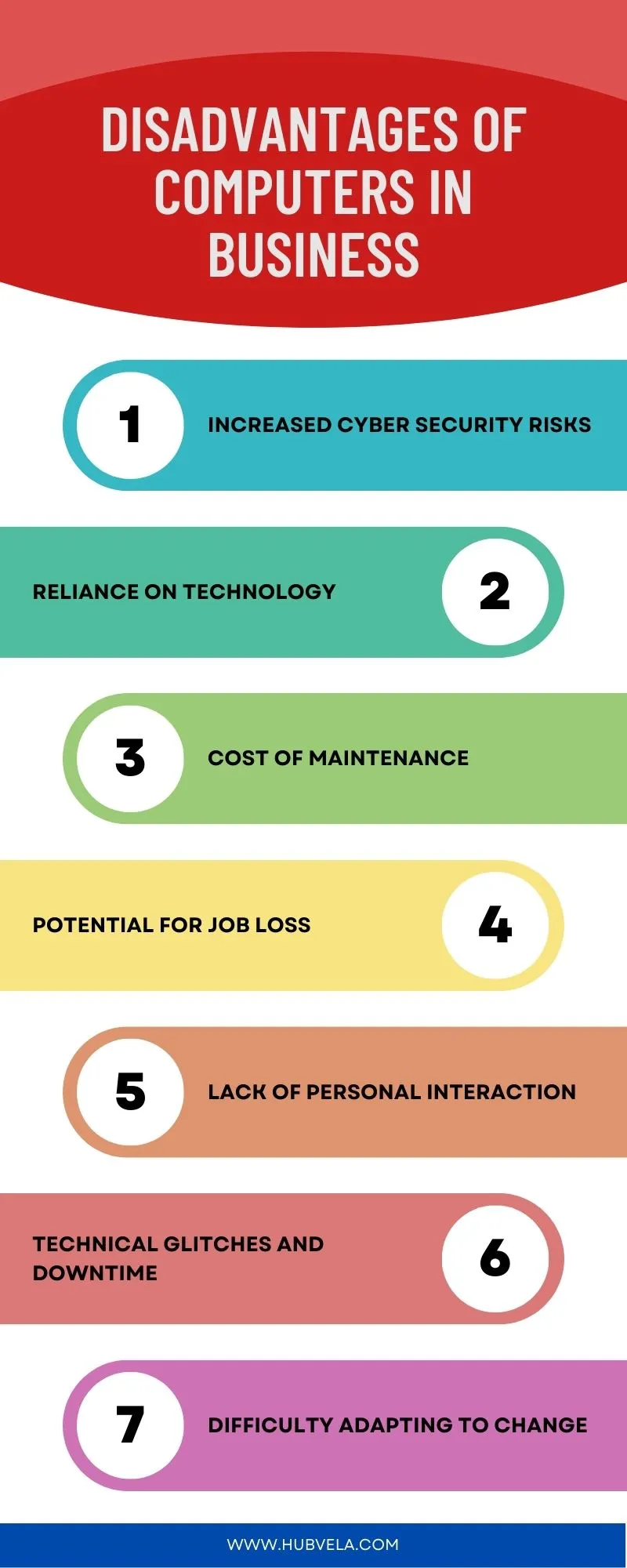Are you interested in the advantages and disadvantages of computers in business?
Computers can be both a blessing and a burden for businesses. They offer a plethora of perks, such as increased productivity, streamlined data management, improved communication, and enhanced decision-making.
However, there are also drawbacks, including a lack of personal interaction, technical glitches and downtime, and difficulty adapting to change.
It’s important to weigh these pros and cons carefully to determine how computers can best serve your business needs.
So, let’s delve into the advantages and disadvantages of computers in business and help you make an informed decision.

--Advertisement--
Advantages of Computers in Business
Computers have become an essential tool for businesses, offering numerous benefits that enhance efficiency and productivity. Some of the key advantages of using computers in business include:

1. Increased Productivity Levels
By utilizing computers in your business, you can significantly enhance productivity levels.
Computers offer increased efficiency, allowing tasks to be completed more quickly and with fewer errors. They also contribute to improved accuracy by minimizing human error.
Additionally, computers enable time-saving measures such as automated processes and streamlined workflows.
2. Streamlined Data Management
How can computers in business streamline data management and provide advantages?
By utilizing advanced data analysis tools, computers can quickly process and analyze large amounts of data, allowing businesses to make informed decisions based on accurate information.
Automation benefits further streamline data management by eliminating manual data entry and reducing the risk of human error.
With efficient workflow processes in place, computers can help businesses organize and access data more easily, improving overall productivity and decision-making capabilities.
3. Improved Communication Channels
Utilizing advanced communication tools, computers in business enhance communication channels, enabling you to efficiently exchange information and collaborate with colleagues and clients. This leads to improved collaboration within the organization, as employees can easily communicate and share ideas.
Computers also facilitate efficient information sharing, allowing for quick dissemination of important documents and updates. Additionally, computers enable remote work opportunities, allowing employees to work from anywhere and stay connected with the team, enhancing productivity and work-life balance.
4. Enhanced Decision-Making Processes
With computers in business, you can make more informed decisions by accessing and analyzing vast amounts of data quickly and efficiently. This improves efficiency in decision-making processes as you can gather and process information in a fraction of the time it would take manually.
By making data-driven decisions, you can rely on accurate and up-to-date information, reducing the risk of errors or biased judgments.
The increased accuracy in decision-making can lead to better outcomes and overall success for your business.
5. Cost-Effective Operations
By utilizing computers in your business operations, you can achieve cost-effective processes and maximize efficiency. Computers enable cost savings through automated tasks and streamlined workflows.
With the assistance of technology, operational efficiency is improved, reducing the need for manual labor and saving both time and money. Additionally, computers help minimize human error, as they’re programmed to perform tasks accurately and consistently.
6. Greater Market Reach
To expand your business’s customer base and reach a wider audience, computers offer the advantage of greater market reach.
With computers, you can tap into market expansion opportunities and engage with customers globally. Through online platforms and digital marketing strategies, you can target specific demographics and regions, allowing for effective customer engagement.
Computers enable your business to transcend geographical boundaries and connect with potential customers around the world, maximizing your market reach and potential for growth.
7. Competitive Edge Gained
You can gain a competitive edge in your business through the advantages of using computers.
By utilizing computers for competitive analysis, you can stay ahead of your competitors by understanding market trends and consumer preferences.
Computers also help you navigate market saturation by identifying untapped niches and opportunities for expansion.
Additionally, computers aid in customer retention by enabling personalized marketing strategies and efficient communication channels.
With computers, you can outperform your competitors and establish a strong position in the market.
Disadvantages of Computers in Business
The use of computers in business has brought about significant advantages, but it also comes with certain disadvantages that should be carefully considered. Some of the key drawbacks include

1. Increased Cyber Security Risks
Addressing the increased cyber security risks is crucial when considering the disadvantages of computers in business. With the rise in data breaches, businesses must prioritize implementing effective cybersecurity measures. Failing to do so can have a detrimental impact on customer trust.
Customers want to know that their personal and financial information is secure when conducting transactions online. Therefore, investing in robust cybersecurity systems is essential for businesses to maintain their reputation and protect sensitive data.
2. Reliance on Technology
Implementing effective cybersecurity measures is important.
Another disadvantage of computers in business is the reliance on technology’s constant availability.
With computers being an integral part of business operations, there’s a reduced human interaction, which can negatively impact job satisfaction.
Overreliance on technology means that when systems fail or experience downtime, it can disrupt workflow and cause frustration among employees.
This reliance on technology can lead to a lack of autonomy and a sense of detachment in the workplace.
3. Cost of Maintenance
Discussing the cost of maintenance is essential when considering the disadvantages of computers in business, as it directly impacts the financial resources required to keep the technology running smoothly.
The cost of maintenance includes expenses for system upgrades and the need for skilled technicians to handle technical issues. These expenses can add up over time, especially for businesses with multiple computers and complex networks.
Additionally, the reliance on external technicians can lead to delays in resolving technical problems, affecting productivity.
4. Potential for Job Loss
You may experience job loss as a result of computers in business. With the potential for job automation, tasks that were once performed by humans can now be completed more efficiently by machines. This can have a significant impact on the workforce, leading to a reduction in the number of available jobs.
However, it’s important to note that while some jobs may be lost, new opportunities for retraining and upskilling may also arise as businesses adapt to technological advancements.
5. Lack of Personal Interaction
One major disadvantage of computers in business is the limited opportunity for personal interaction due to the automation of tasks. With computers handling many routine tasks, there’s reduced interpersonal communication and limited face-to-face interaction among employees.
This can lead to decreased social interaction and a lack of personal connection in the workplace. Without the chance for in-person collaboration and communication, important aspects of teamwork and relationship building may be compromised.
6. Technical Glitches and Downtime
When it comes to computers in business, dealing with technical glitches and downtime can be a major challenge. In order to overcome these issues, it’s essential to have reliable technical support in place.
Regular system upgrades can help prevent glitches and improve overall performance.
Having a robust data backup and recovery system ensures that important business information is protected in case of any unexpected downtime or system failures.
7. Difficulty Adapting to Change
The difficulty of adapting to change in business can be a disadvantage of computers. With the introduction of new technologies and software, businesses often face adaptation challenges. Employees may resist change due to a fear of the unknown or a lack of understanding. Additionally, organizational inflexibility can hinder the implementation of new systems and processes.
However, it’s crucial for businesses to overcome these challenges and embrace change in order to stay competitive in today’s fast-paced digital world.
Conclusion on Advantages and Disadvantages of Computers in Business
To sum up the advantages and disadvantages of computers in business, you should take into account both the efficiency and productivity gains, as well as the potential security risks they entail.
While computers have undoubtedly improved efficiency and productivity in business operations, the impact on efficiency may vary depending on the industry and the level of computerization.
Additionally, the future implications of relying heavily on computers in business should be carefully considered to ensure the advantages outweigh the potential disadvantages.


